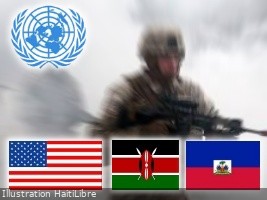Haiti’s Emerging Security Crisis: A Call for International Support
Context of the Situation
In recent years, Haiti has grappled with escalating violence and instability, primarily fueled by rampant gang activities. This crisis has drawn the attention of the international community, prompting urgent discussions on how to restore order in the nation. A notable event occurred on September 23, 2025, when representatives from the United States, Kenya, and Haiti convened a high-level meeting in New York to advocate for a robust response to the worsening security situation.
Transformation of the Multinational Security Support Mission
At the heart of the discussions was the proposal to evolve the existing Multinational Security Support Mission (MMSS) into a more effective “Gang Suppression Force” (GSF). Kenyan President William Ruto highlighted the systemic issues plaguing the current mission: insufficient personnel, inadequate resources, and a lack of logistical support—all of which hinder its effectiveness on the ground. He noted that, out of the originally planned 2,500 police officers, fewer than 1,000 were actively deployed, underscoring a critical gap in capability.
U.S. Perspective
The United States echoed these concerns, advocating for the creation of a new force comprising over 5,500 personnel. This larger body would operate under a United Nations mandate aligned with Chapter VII of its Charter, which permits military action in response to threats to international peace. U.S. Assistant Secretary of State Christopher Landau voiced the urgent need for this transformation, lamenting that the current mission lacks both the mandate and resources necessary to contend with the growing violence.
The Road Ahead: Diplomatic Efforts
While the proposal has received broad support among UN Security Council members, the path to adoption remains fraught with challenges. Notably, countries like Russia and China could impede progress, as both have historically approached the Haitian situation with caution. Thus, the clock is ticking, with a crucial vote approaching before the current mission’s mandate expires on October 2, 2025.
Haitian Leadership’s Stance
For Haiti’s transitional authorities, the establishment of a new international force is not merely a preference but a necessity. Laurent Saint-Cyr, President pro tempore of Haiti’s Transitional Council, emphasized the need for continuous international support to prevent a security vacuum that could be disastrous for the nation. He stressed the importance of action over promises, urging for immediate steps to fill the upcoming gap in security operations.
Final Thoughts on the Urgency of Action
The intensity of the situation in Haiti calls for rapid responses from the international community. As discussions unfold, the collaboration among the U.S., Kenya, and Haitian leaders reflects a collective acknowledgment of the critical need for a proactive and well-resourced response to restore stability in the region. Both the daunting challenges facing the MMSS and the promise of a strengthened GSF aptly illustrate the high stakes involved in addressing Haiti’s security crisis.
Related Insights
For those interested in further exploring the dynamics of this situation, additional resources are available that provide updates on the progress in Kenya’s contributions to the security mission and examine the broader geopolitical implications of international involvement in Haiti’s affairs. Links to these resources can be found below:



